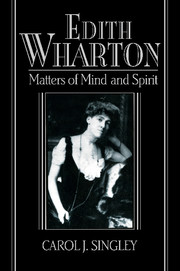Coda
Published online by Cambridge University Press: 06 August 2010
Summary
Who, then, is Edith Wharton? What motivated her religious, spiritual, and philosophical quest? And what answers did she find? Despite her ability to portray social customs with faultless detail, critics are mistaken when they conclude, as does early commentator E. K. Brown, that her work is “indépendante du divin” (324, original emphasis). Nor is it true that her fiction exhibits no cosmic philosphy (Russell 432) or moral center (Dixon 211). It is the case that Wharton's religious sensibilities developed as a result of widely different influences – including genteel religion that often subordinated strenuous faith to sociability and comfort; a love of life's pleasures that competed with codes of truth telling and punishment for happiness; and a desire to strengthen woman's vulnerable position within the structures of patriarchy.
Edith Wharton was born an Episcopalian; she inherited a Calvinist sensibility; and she flirted with transcendental philosophies. She arrived finally at the door of Catholicism, but neither it nor Protestantism – whether homespun or genteel – could fully answer her spiritual needs. All religions fell short of the philosophical ideals to which she aspired – and none incorporated the qualities of the feminine to the extent that she would have liked. Wharton was a member of the group that Jackson Lears calls “tourists of the supernatural” (174), whose agnosticism and hardedged positivism prevented her surrender to historical nostalgia or simple belief, yet whose spiritual longings sustained the search for immutable values.
- Type
- Chapter
- Information
- Edith WhartonMatters of Mind and Spirit, pp. 209 - 212Publisher: Cambridge University PressPrint publication year: 1995

